1
Knowledge’ may be there but ‘correctness’ is required along with it. If you have ‘knowledge’ but don’t have the ‘correctness’; you will go to moksha, but others will not gain any benefit!Dada Bhagwan
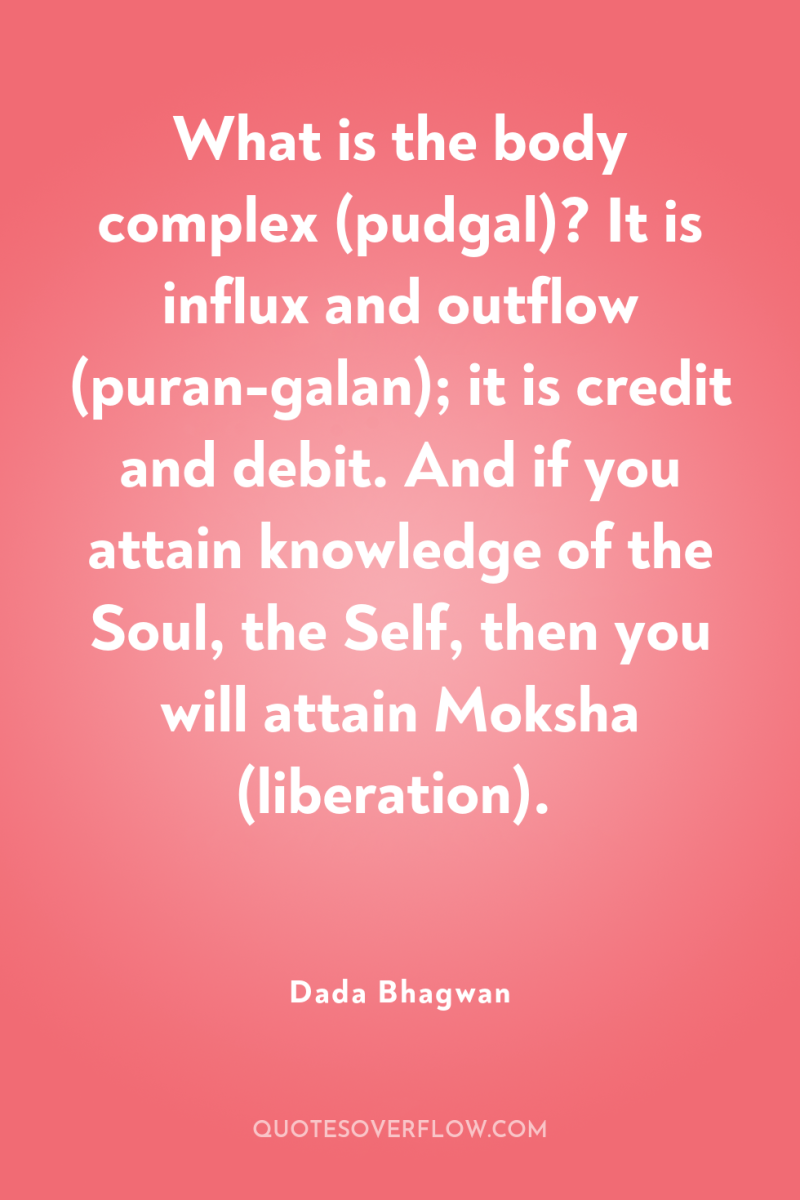
2
What is the body complex (pudgal)? It is influx and outflow (puran-galan); it is credit and debit. And if you attain knowledge of the Soul, the Self, then you will attain Moksha (liberation).Dada Bhagwan

3
I slept under the moonlight and set my soul free, caged within jars like fireflies".Prajakta Mhadnak
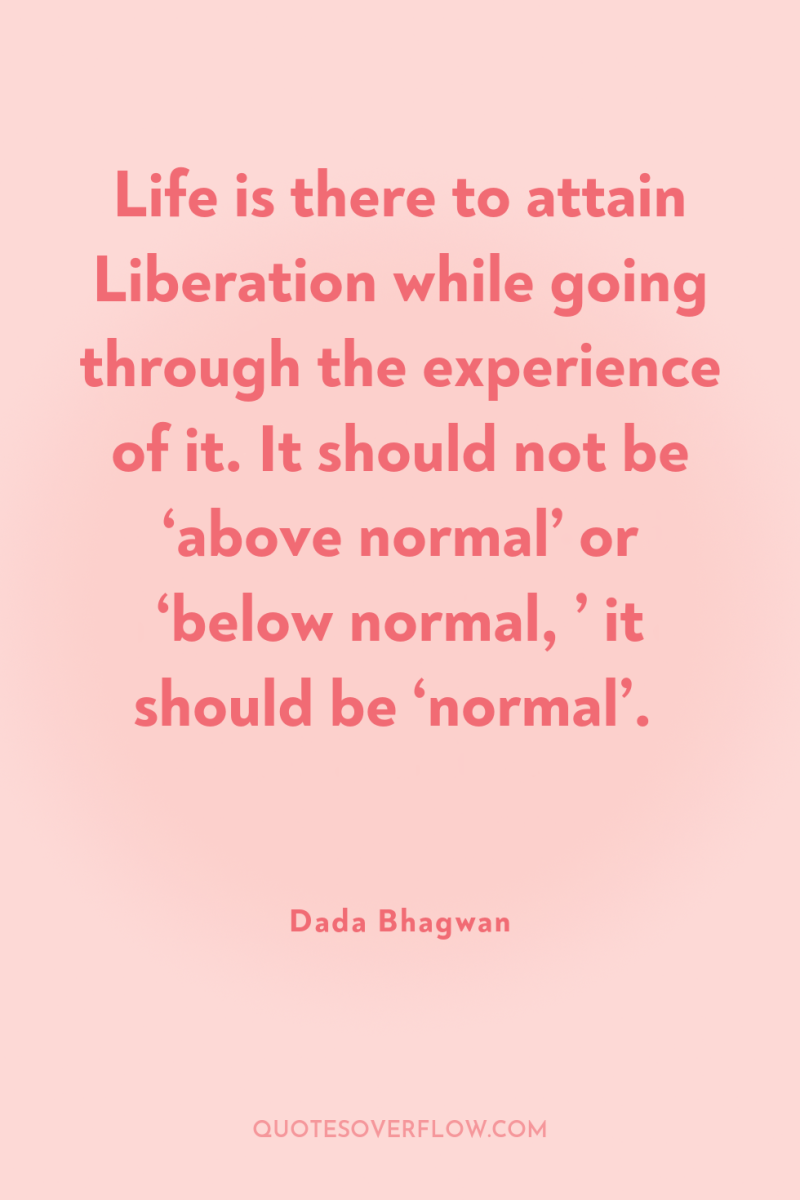
4
Life is there to attain Liberation while going through the experience of it. It should not be ‘above normal’ or ‘below normal, ’ it should be ‘normal’.Dada Bhagwan
5
Worshipping ‘Gnani Purush’ [the enlightened one] is equal to worshiping the Pure Soul and it is indeed same as the worship of absolute supreme Self (Parmatma). And it is the main cause for moksha [final liberation].Dada Bhagwan
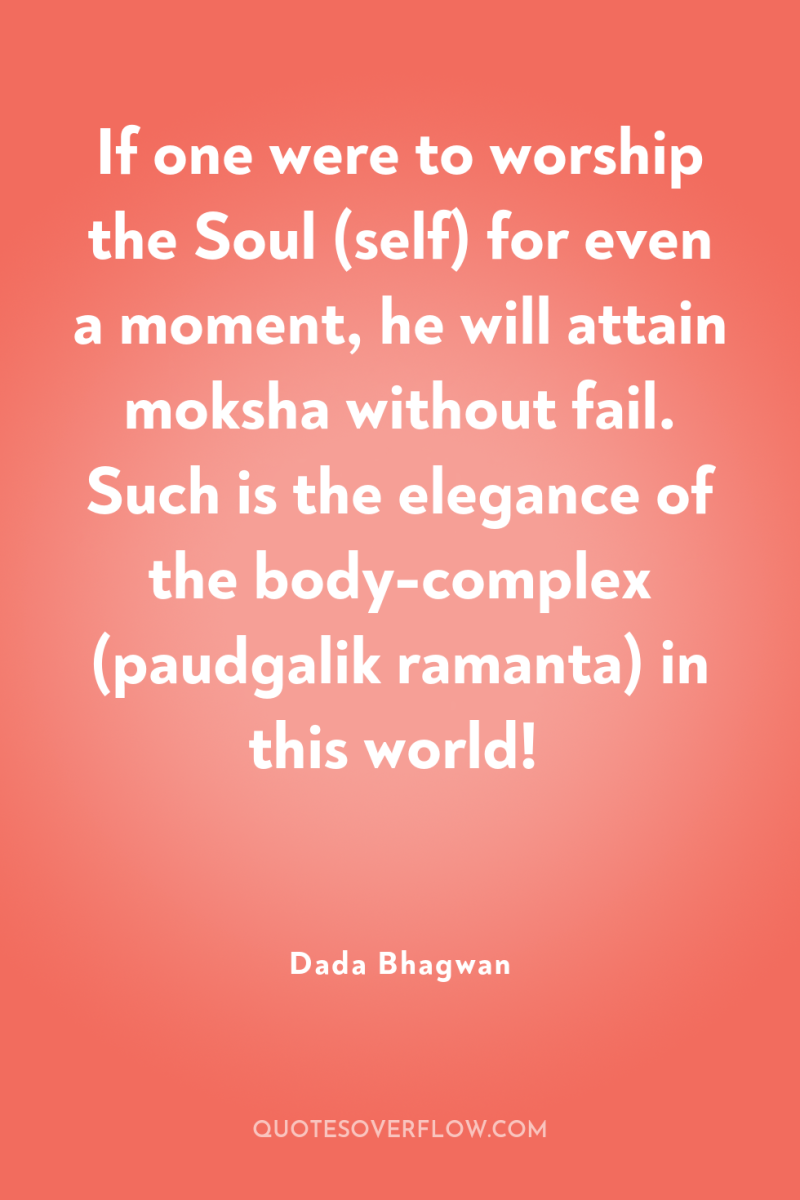
6
If one were to worship the Soul (self) for even a moment, he will attain moksha without fail. Such is the elegance of the body-complex (paudgalik ramanta) in this world!Dada Bhagwan
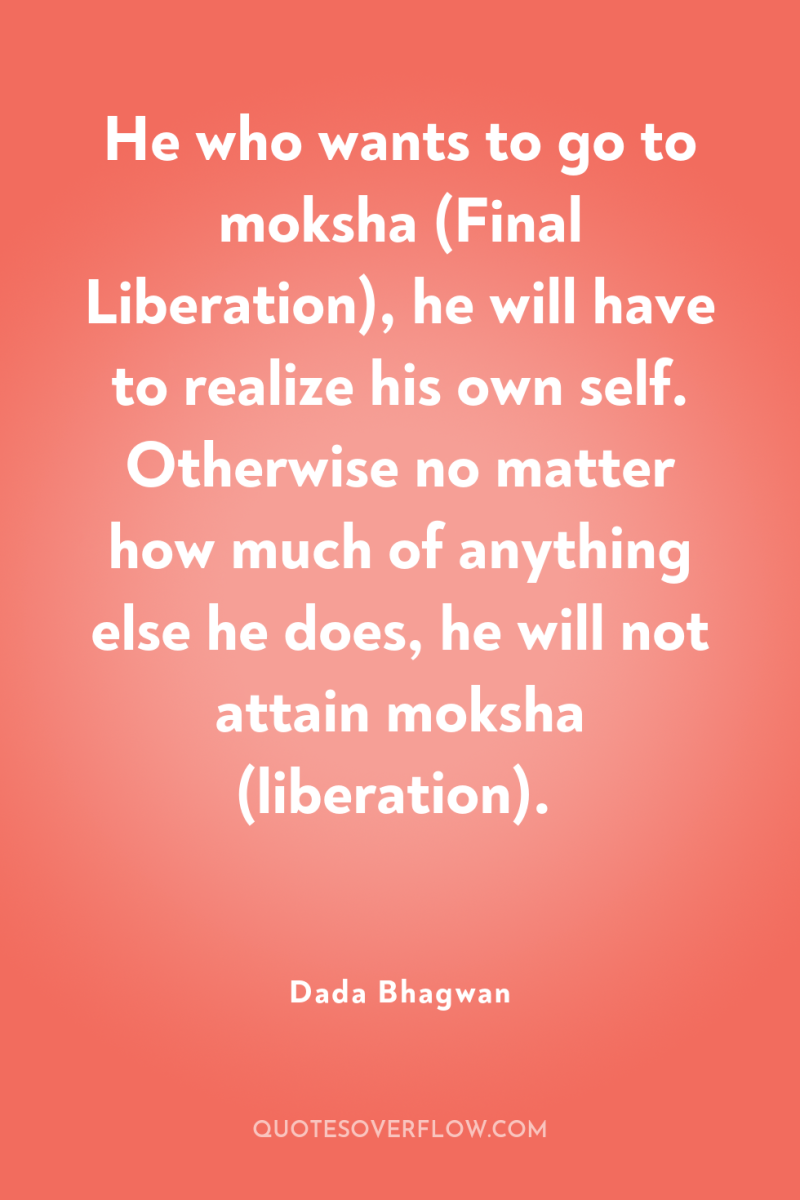
7
He who wants to go to moksha (Final Liberation), he will have to realize his own self. Otherwise no matter how much of anything else he does, he will not attain moksha (liberation).Dada Bhagwan
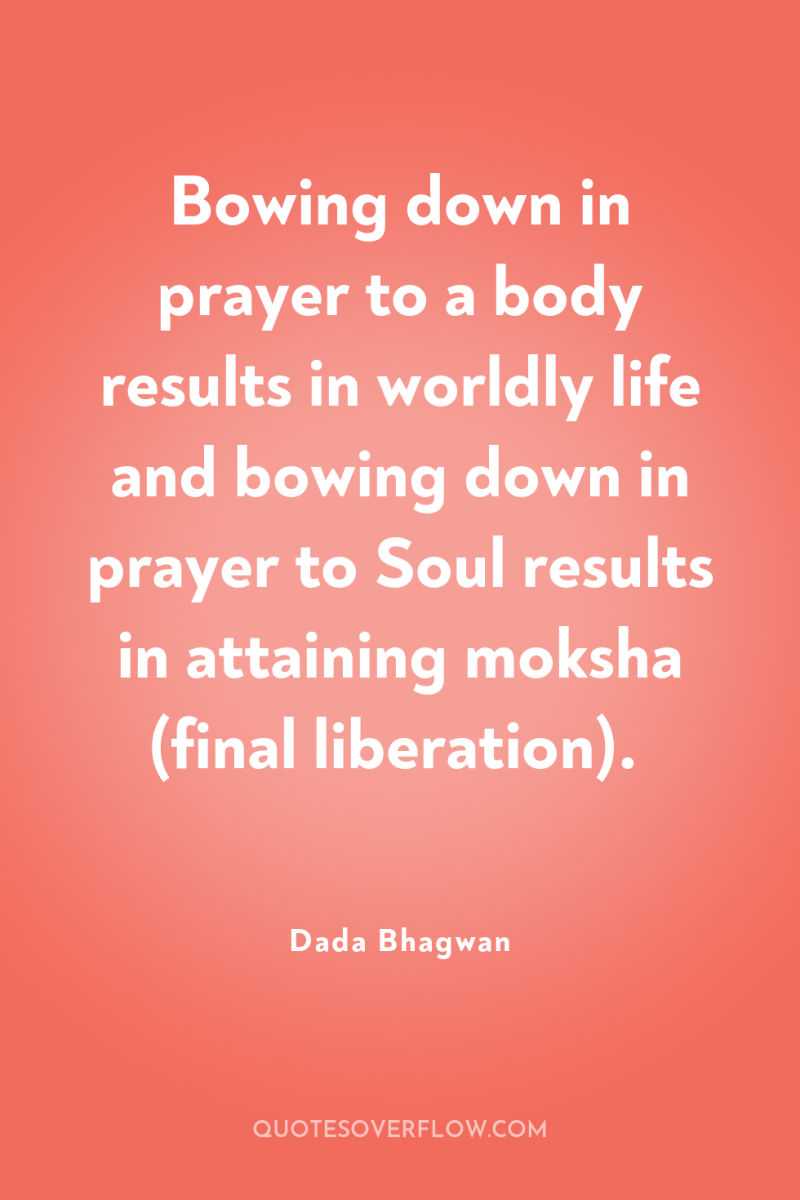
8
Bowing down in prayer to a body results in worldly life and bowing down in prayer to Soul results in attaining moksha (final liberation).Dada Bhagwan
9
Who doesn’t allow one to attain siddh gati (the final state of Liberation, moksha)? The body-complex (pudgal - that which charges and discharges). Similarly, what doesn’t let a gourd covered with mud, to go on top and float on water? The mud. The negative atoms, they weigh very heavily. They drag the Soul, the Self lower down.Dada Bhagwan
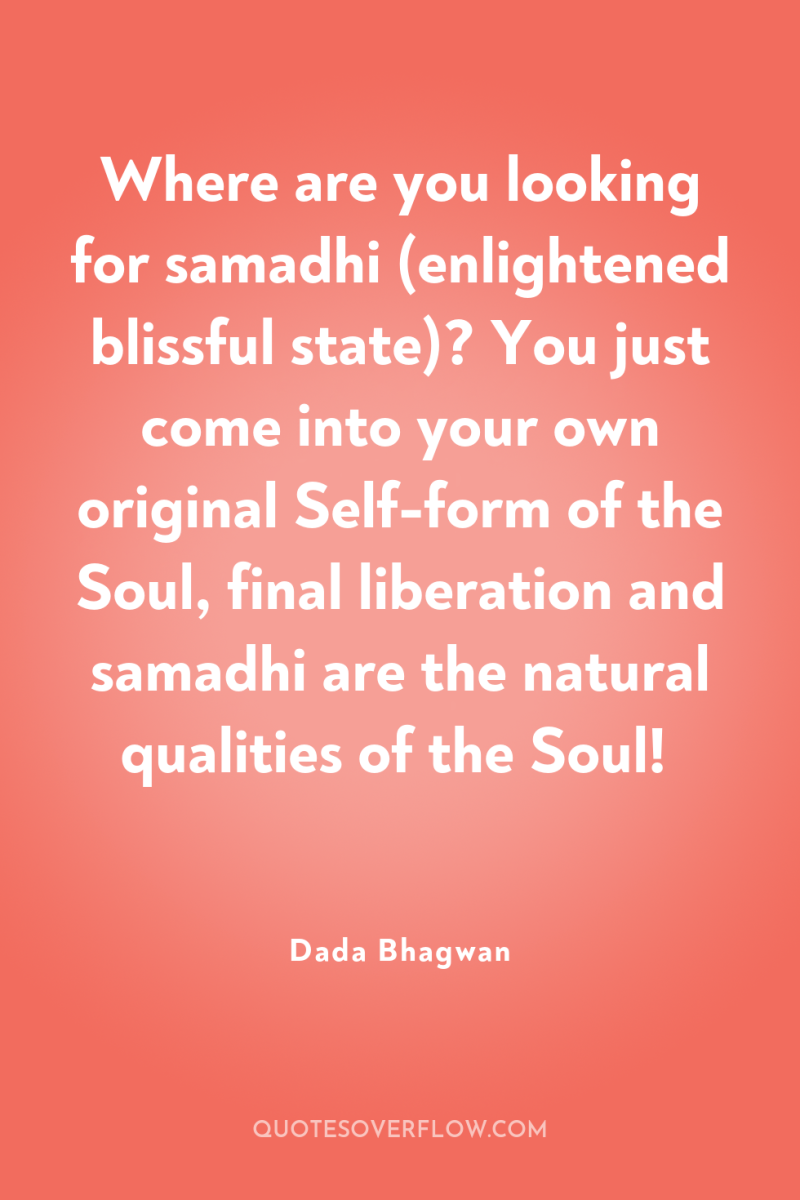
10
Where are you looking for samadhi (enlightened blissful state)? You just come into your own original Self-form of the Soul, final liberation and samadhi are the natural qualities of the Soul!Dada Bhagwan
11
There is no means other than vitrag-science (science that frees us from all attachments) that will give Final-Liberation [Moksha]. Other means [methods, instruments] will cause bondage; they only help to pass the time; [whereas] means to attain the Eternal Thing (experience of Pure Soul) can be attained from the ‘Gnani Purush’ (the enlightened one).Dada Bhagwan
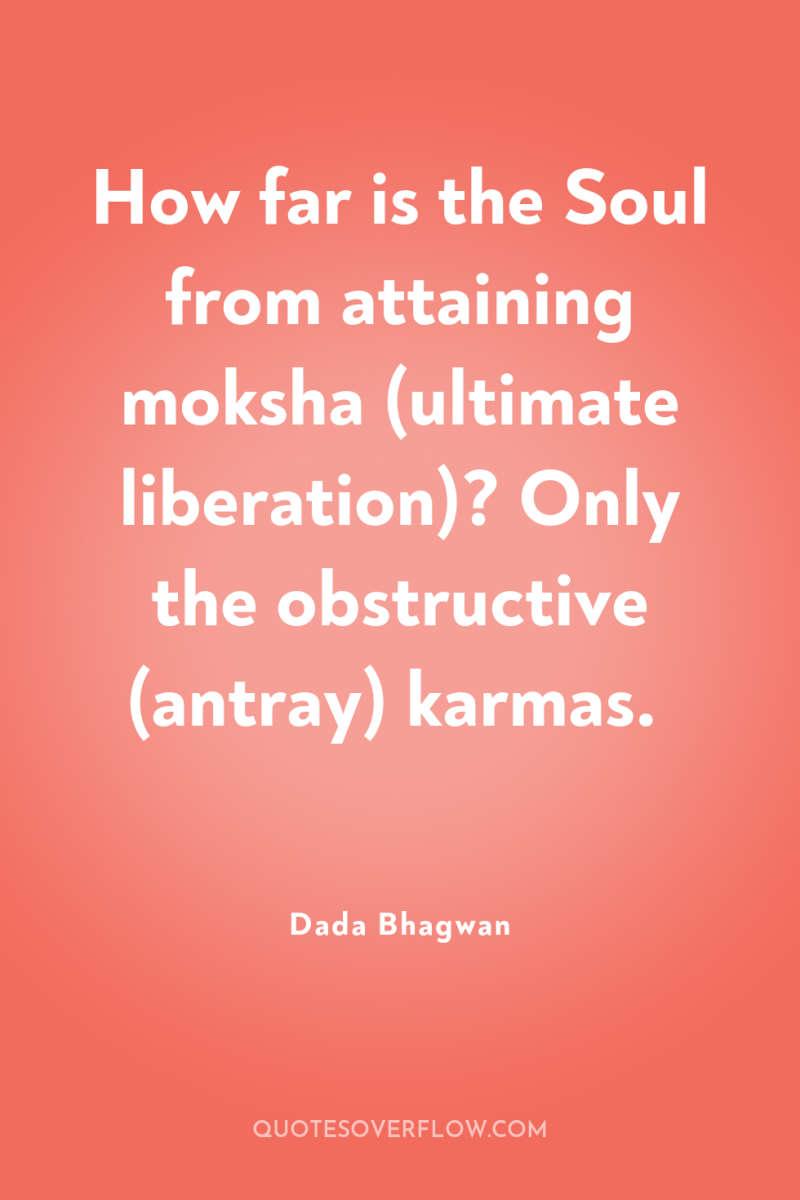
12
How far is the Soul from attaining moksha (ultimate liberation)? Only the obstructive (antray) karmas.Dada Bhagwan
13
Fruit of discharge karma with shukladhyan (contemplation as the Self, Pure Soul) is moksha, and fruit of discharge karma with dharmadhyan (auspicious contemplation; to not hurt anyone, to give happiness to others) is tremendous punya. It binds punyanubandhi punya (merit karma which binds more merit karma).Dada Bhagwan
14
If there is true ‘Selfishness, ’ then there is ‘liberation of the Self’, and that indeed is one’s own form (the Self).Dada Bhagwan
15
Religion [dharma] originates where there is doer-ship [to do], Moksha [ultimate liberation] originates where there is understanding (to understand).Dada Bhagwan
16
The one who straightens out himself will attain moksha [will be liberated]. If you don’t straighten out, people will beat you into doing so. The doorway to moksha [ultimate liberation] is narrow, so how will you be able to enter if you are obstinate?Dada Bhagwan
17
As long as there is the egoism of ‘I-ness’ (hoonpanu) and the partiality towards ‘my-ness’ (marapanu), how can there be liberation till then?Dada Bhagwan
18
In reality, the outer instruments (hands, feet, eyes, etc) are not the hindrance (for liberation); it is the inner instrument (mind, intellect, chit and ego) that is obstructive.Dada Bhagwan
19
Insistence on one’s own opinion can never lead to attainment of Moksha [Ultimate Liberation]. Only those who are free of insistence will attain Liberation.Dada Bhagwan
20
As long one is not able to let go of the insistence on a certain opinion [faith, sect], he has not earned the right for Moksha [Ultimate Liberation]. He is not worthy of Moksha if he is in the sect. He is only worthy of material happiness; he is worthy of a celestial life.Dada Bhagwan
21
When there is no venom (poison) of any kind in your eyes, when a liberated smile is seen, then people will do your darshan (will come to see you with intent of worship).Dada Bhagwan
22
When you become worthy of people’s worship, you will be able to attain moksha (liberation), you cannot go to moksha just like that. Reproach (criticism) by people is the cause of a life in the lower realms.Dada Bhagwan
23
Mind is indeed that which takes one to Moksha, and it is also the mind that makes one wander around in the worldly life. One needs to just turn it in the right direction. It had been turned in the wrong direction, and so it needs to be turned in the right direction.Dada Bhagwan
24
Moksha (Liberation) is to become free from gathering & dispersing of circumstances.Dada Bhagwan
25
If one’s mind becomes conflict-free, that is ‘moksha’; conflict filled mind, that is worldly life.Dada Bhagwan
26
If you want to go to moksha (attain ultimate liberation), you will have to become simple and straightforward. Being obstinate won’t work there. You will have to remove all the tubers; become totally free from intellect (abudh).Dada Bhagwan
27
What is it that doesn’t allow you to go to moksha? Obstinacy!Dada Bhagwan
28
If one has egoism without my-ness, he will go to moksha; all this entrapment is there because of egoism with my-ness!Dada Bhagwan
29
What does Jinmudra (Tirthankar God’s sitting posture) say? The lotus position of Vitrag Lords, one hand and foot placed over the other, preaches, “Oh, humans! Understand this if you have the wisdom. You have already brought with you the food, drink and all things you need; therefore, let go of the awareness that ‘I am the doer’ and make effort to attain Moksha (ultimate liberation)!Dada Bhagwan
30
Where the ‘charging’ (of karma) stops, there lies the symptoms (signs) of attaining moksha.Dada Bhagwan
31
The person who wants to progress on the path of Vitrag (the enlightened ones), should keep the focus of the awareness to progress from the non-auspicious (bad) to the auspicious (good). And if one wants to go to final Liberation [moksha], he should keep ‘pure focus as the Self (Soul)’ (shuddha upayog). The person, who wants to go to Moksha, should not concern himself with the auspicious (good) or the inauspicious (bad). He should keep them both as the things to be cleared out. .Dada Bhagwan
32
Who is considered as not living in the worldly life? The person who doesn’t have focus on the non- Self. ‘I’ (the Gnani Purush) do not live in the worldly life even for one moment. Liberation (Moksha) is to be found through the one who does not live in the worldly life. What can you not attain through the grace of such a person?Dada Bhagwan
33
Shukladhyan (pure contemplation of the Self, the Soul) is the direct cause for moksha (liberation). Dharmadhyan (auspicious contemplation; to hurt no one, give happiness to others) is the indirect cause for moksh (liberation). Artadhyan (inner mournful contemplation that hurts the self) is a cause for a birth in animal life form (non-human). Raudradhyan (wrathful contemplation that hurts the self and others) is a cause for a life in hell. .Dada Bhagwan
34
Moksha (ultimate liberation) means that you just have to change your vision.Dada Bhagwan
35
Absence of conflict creating intents is itself Moksh (Ultimate Liberation).Dada Bhagwan
36
The entire path of the Vitraag Lords (the enlightened one) is one of humility (vinaya). The practice of humility (vinaya dharma) begins from Hindustan (India). There are endless practices of humility, starting from putting two hands together (in the gesture of Namaste) to prostrating. And ultimately when one attains absolute humility (param vinaya), he attains moksha (ultimate liberation).Dada Bhagwan
37
Moksha (ultimate liberation) cannot be attained until purity arises. To attain purity one has to realize ‘Who am I?Dada Bhagwan